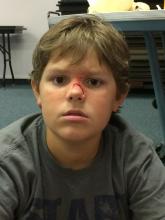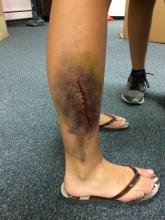Library Blog
Library Blog
7/20/17
Our Zombie Lock In was a blast! We started with a wound clinic. Everyone who wanted a wound got one. Troy and DJ Strang administered wounds to several teens then we ate pizza and zombie fingers then we played Zombie tag and watched a couple movies. Jennifer Mascher was a great help in supplying humans with ammunition to keep the zombies at bay.
7/13/17
The Vanishing American Adult by Ben Sasse
Review by Sherry Preston
I heard about “The Vanishing American Adult” by Nebraska Senator Ben Sasse first in an interview on Morning Edition on NPR then on “Wait Wait... Don’t Tell Me” one Saturday morning shortly afterwards. He was pretty darn funny in the interviews. He writes with some sensibility about what’s wrong with kids these days. I recognized my kids in the introduction- in fact I made them listen to it.
Sasse notes that as average age of marriage and age of establishing a separate household have increased, the result has been an extended adolescence in America. He “unpacks” a plan for focusing on life experiences in addition to formal education to expand our children’s horizons. He contends that hard work builds character, and our future citizens need a variety of life experiences before they will be able to fully function in our “republic with a lower case r.”
In various chapters Sasse encourages us to embrace multi-generational understanding, work hard, consume less, travel to learn rather than as a tourist, and read a common cannon of books so we can engage in discussion where everyone has the same facts to work with.
I actually listened to this book through Audible. Senator Sasse reads it himself, and he does a good job. Sasse brings his college-educated vocabulary and syntax skills to this book. While I understand his intent, he probably could have used more accessible words and got his point across just as well, for example:
“Wealthy societies, for reasons largely well-intentioned but now producing unintended consequences, are making it easier for their teens to avoid the rigors and responsibilities of becoming a grown-up. Arnett calls those years the “self-focused age,” when there are few real responsibilities, few “daily obligations,” limited “commitments to others.” In a stage when young people were once supposed to learn to “stand alone as a self-sufficient person,” they find themselves increasingly paralyzed by over-choice. There are nearly unlimited personal-social options yet too few concrete work-related accomplishments.”
“The Vanishing American Adult” reads more like a collection of essays than a book, and the chapters tend to wander through topics that don’t particularly relate to the subject at hand. The author has blind spots when it comes to what America’s citizenry looks like versus what he thinks it looks like. While his list of books we should all read in the back includes Plato and Rousseau, it leans towards, in his words, “dead white guys” and doesn’t mention much of anybody east of Europe. Sasse overuses buzzwords which will date this book, for example, he “unpacks” a lot of ideas.
While I see flaws in “The Vanishing American Adult,” I did enjoy it. I think a lot of what he says is correct and it reminded me that I need to expect my kids to complete a job, let them fail on their own, learn to adapt, and of how vital it is to raise kids who can think for themselves and are eager to learn. I am not sure how Sasse’s ideas will come into play, but he wrote this book to start a dialogue.
Anyone who is concerned about the future of our society might enjoy this book. You can find “The Vanishing American Adult” by Senator Ben Sasse on the new book shelf at Gering Public Library.




